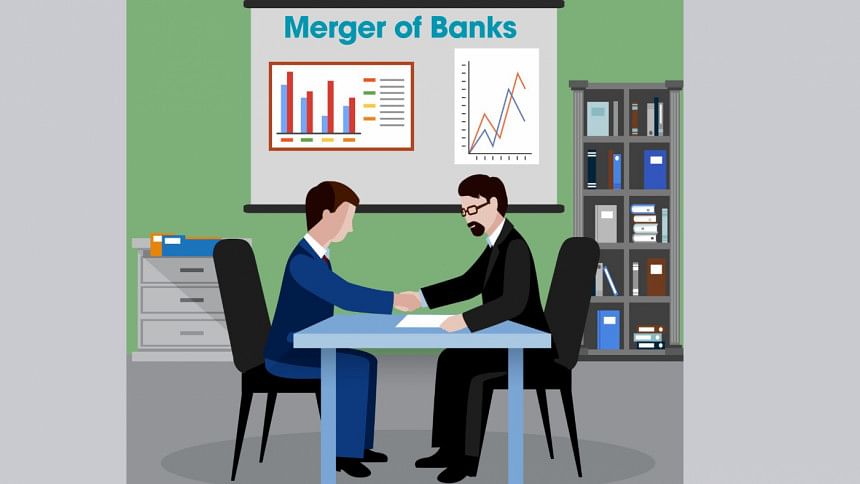Merger of banks: Who wins, who loses?

Padma Bank, which has been creaking under the burden of non-performing loans, is going to be taken over by Exim Bank, while some other weak banks may follow suit as part of a central bank's move to restore governance in the crisis-hit banking sector.
Although the word merger is being used by the authorities, it would ultimately be an acquisition where Exim Bank will buy Padma Bank and the latter would one day cease to exist.
Although there are examples both at home and abroad of successful mergers, the latest move in Bangladesh has raised questions about who will emerge as a winner and who will be a loser.
Initially, it is the general stock investors who might be at the receiving end of the process while the loan defaulters, whose misdeeds are largely responsible for Padma Bank's current misfortunes, might come out victorious.
Weak banks usually cannot get rid of an unsustainable level of NPLs, lower efficiency of people and weak corporate culture overnight. Therefore, the acquirer bank will have to reshuffle its business priority and will take on the monumental task of instilling sound corporate culture into troubled branches. As a result, the acquirer's profit may suffer.
If the government purchases the NPLs of the weak bank, the acquirer will still have to operate with the regular borrowers of the weak bank who don't follow a good corporate culture.
The case of forming Bangladesh Development Bank Ltd (BDBL) after the merger of two state-run lenders -- Bangladesh Shilpa Bank and Bangladesh Shilpa Rin Sangstha -- showed how difficult it is to gain good health even after combining two weak firms into a new entity. BDBL is still struggling 14 years after the merger due to the huge default loans.
The bad performance of the acquirers ultimately hits their stock investors because they may fail to retain their consistency in giving out handsome dividends. As a result, their shares may take a beating. So, the question arises as to why a general investor who invested in a good bank will bear the burden of weak ones.
According to the central bank's guidelines on the merger or amalgamation of banks and financial institutions, the parties will have to get approval from their shareholders.
If the acquisition proposal is put to the vote during the annual general meeting or extra general meeting, the scheme of acquisition has to be voted yes by a majority, representing three-fourths in value of the members present.
But the question is whether any rational shareholder of a well-performing bank will allow the purchase of a weak bank. The answer should be a straightforward "no" since it will hurt their investment.
However, the history of getting agenda passed in shareholders' meetings tells that the board of directors secures the approval by any means, even by way of presenting fake investors or forcing the real investors to keep mum.
Most of the well-performing banks don't want to acquire the weak banks. A top official of a leading bank expressed his disappointment, saying: "Is becoming a well-performing bank a sin? Why will we have to take over a sinking bank?"
The government plans to give some respite to acquirers by purchasing NPLs through an asset management company. In that case, the government is going to use taxpayers' money. The taxpayers are unlikely to approve such a move that will benefit large loan defaulters who are mostly politically backed.
Therefore, without any strict steps against loan defaulters, neither merger nor acquisition will bring any desired outcome. So, the government should have allowed weak banks to go out of business so that depositors think twice before keeping funds under their custodian in the first place.
Besides, weak banks should be forced to publish the names of defaulters to name and shame them. However, , with the merger or acquisition, defaulters will not be punished, no director or bank officials will face the music, will be put on trial and jailed for stealing or helping steal people's hard-earned money.
The most unfortunate part is the public will never know about the persons responsible for the downfall of banks. Rather, the loan defaulters may get off scot-free and be on the prowl for their next prey.

 For all latest news, follow The Daily Star's Google News channel.
For all latest news, follow The Daily Star's Google News channel. 










Comments